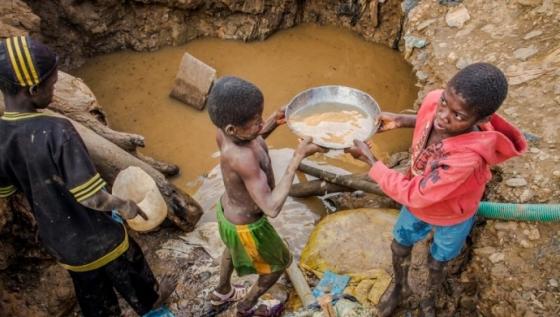Liberia Makes Strides Tackling Child Labor, But...

4.2 percent of Liberian children (age 14 and under) who work are involved in the mining sector.
-- US Department of Labor 2020 Report
The U.S. Department of Labor has released its 2020 findings on the Worst Forms of Child Labor (also known as the Trade and Development Act Report) in accordance with the U.S. Trade and Development Act (TDA) of 2000.
The TDA report includes an assessment of the Government of Liberia’s actions to eliminate the worst forms of child labor. In this year’s report, Liberia was assessed as making “moderate advancement” in its efforts, the second-highest of five assessment levels.
Following the release of the report, which can be accessed at the US Department of Labor website, the United States Embassy near Monrovia congratulated the Republic of Liberia on this progress.
The report says that, despite the COVID-19 pandemic, Liberia’s labor inspectorate conducted 1,200 inspections at worksites in 2020, including over 100 unannounced labor inspections, compared to an estimated 236 inspections in 2019. In addition, the government investigated two suspected cases of child trafficking, initiated or advanced the prosecution of three cases, and convicted one individual who awaits sentencing.
According to the Report, however, children in Liberia are subjected to the worst forms of child labor, including in forced domestic work, sometimes as a result of human trafficking.
About 136,340 (16.6 percent) of the population of Liberian children (ages 5-14) are working, the report says. Of this number, 78 percent are found in the Agricultural sector. In this sector children are involved in the production of rubber, including cutting trees with machetes and using acid; production of charcoal; and other farming activities, including production of cocoa, coffee, cassava, and sugarcane.
Another key sector where Liberian children (4.2 percent) are found at labor is in what the DOL labels as ‘industry’, involving the mining of diamonds and gold, including washing gravel and using mercury and cyanide. This also includes the manual production of crushed rocks and the carrying of heavy loads.
However, the report says, 17.4 percent of working Liberian children are in the services sector, which includes street vending, begging, carrying heavy loads and domestic work.
Meanwhile, only 14 percent of working children are also in school. In Liberia, the minimum age for work is 15 years of age, while for hazardous work, one must be at least 18 years of age. The compulsory education age is 14 years of age. However, the report says, gaps exist in Liberia's legal framework to adequately protect children from the worst forms of child labor, including the 1-year break between the compulsory education age and the minimum age for work.
According to the report, the minimum age for work is not in compliance with international standards because it allows children younger than age 16 to engage in work as long as it is outside of school hours, the employer keeps records of the child’s schooling, and the child is literate and attends school regularly. Because of this, children of any age may be vulnerable to child labor. Although the Decent Work Act prohibits children younger than age 15 from working full time, it does not prevent children below this age from engaging in part-time employment.
“Each person must do their part to end exploitation and expose those who engage in abusive labor practices,” the Embassy said in a statement. “The challenge is immense but so are the opportunities for action. We hope the Government of Liberia will use the information in this report to take concrete steps to make these injustices a relic of the past.”
The U.S. Trade and Development Act requires that a country implement its commitments to eliminate the worst forms of child labor in order to be eligible to be designated a beneficiary developing country under the U.S. Generalized System of Preferences. It also mandates that the President of the United States submit to Congress the Secretary of Labor’s findings with respect to each beneficiary country’s implementation of its international commitments to eliminate the worst forms of child labor.
Each country in the TDA Report receives an assessment to indicate clearly the Secretary of Labor’s findings on each country’s level of advancement in efforts to eliminate the worst forms of child labor during the reporting period. The report analyzes the Government of Liberia’s efforts to eliminate the worst forms of child labor through their legislation, enforcement, coordination, policies, and social programs. Liberia is one of 131 countries, non-independent countries, and territories profiled.
Each country receives one of five possible assessments: Significant advancement, moderate advancement, minimal advancement, no advancement, or no assessment.
“Liberia received a ‘moderate advancement’ assessment, an achievement for which those working in the Government of Liberia on this issue deserve credit for their sustained efforts,” the Embassy said. In addition, each TDA Report country profile contains suggested actions for the government to consider implementing over the coming year.
Suggestions include: raising the compulsory education age to be consistent with the minimum age for employment; ensure that penalties for employing children under the minimum age for work are stringent enough to deter violations; and Ensure adequate funding for child labor enforcement agencies, such as the Ministry of Labor, the Liberia National Police, and the Women and Children Protection Section, and provide necessary training for such officials to enforce child labor laws; among others.
Liberia is also strongly encorouraged to accede to the United Nations Committee on the Rights of the Child's Protocol on Armed Conflict and the Protocol on the Sale of Children, Child Prostitution, and Child Pornography, and ensure that the minimum age for work is in compliance with international standards.
“We hope this report, including the suggested actions, can be a point of continued dialogue and collaboration between our two governments on eliminating child labor, particularly its worst forms,” the statement from the Embassy concluded.
